Microsoft's Surface phone should be much more than just a 'phone'
"No one wants Win32 desktop apps on a Surface 'phone.'"
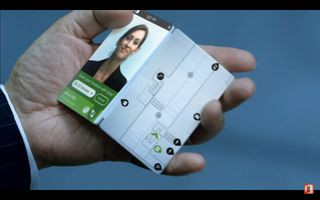
At least that's what the critics say about the 16 million legacy apps that will accompany full Windows 10 on a potential ARM-based Surface "phone". Though the prospect of such a device excites techies, those critics' concerns are not without merit.
Their condemnations conjure unappealing images of a user attempting to run full Photoshop on a five-inch display, for instance. Moreover, they ask legitimate questions such as, "How many consumers are asking for desktop apps on their touch-friendly smartphones?" Mobile apps are ideal for the traditional smartphone form factor, and smartphone users are both familiar and comfortable with them after all. Other than techies like myself and some of you reading this, there honestly are not many folks looking to put full desktop apps on a smartphone.
So if it's obvious that there is no huge demand for Win32 apps on phones, why does it seem like Microsoft is so focused on making it happen? Well … it's not.
A matter of perspective and positioning
Perception matters. In relation to its phone-related mobile strategy, Microsoft has to work very hard to reshape how it is perceived if it will succeed.

If my ongoing analysis is correct, Microsoft's Surface phone will not be a phone at all, but it will be an ultramobile PC with telephony. If accurate, the Who-wants-Win32-apps-on-a-phone question from critics does not apply here. It is inherently irrelevant. Why? The device that will be running these Win32 apps will not be a phone. It will be a Windows 10 PC and, and as we know, Win32 apps have a place on PCs.
Smartphones are dead: Evolve or die, Microsoft's ultramobile PC strategy
If that's the case, then why are we having this conversation within the context of smartphones, and a Surface phone to be precise? Simple. Just as the Surface brought the tablet into the laptop conversation, this category-defining ultramobile Surface PC will also cross boundaries.
Get the Windows Central Newsletter
All the latest news, reviews, and guides for Windows and Xbox diehards.
We have been hardened to think "phone" when it comes to pocketable devices.
This is where the problem of perception rears its head in relation to the hopes of the Windows phone fan. Since 2010, we have grown accustomed to the "wait until next year" placing of our faith in what Microsoft's phone strategy would finally yield. From Windows Phone 7 to the improvements of Windows Phone 7.5, to Windows Phone 8 and the revisions of Windows Phone 8.1, to the not-ready-for-prime-time Windows 10 Mobile when it debuted, fans hopes in Redmond's "phone strategy," seven years later are unfulfilled.
Coupled with the impossible-to-ignore success of Apple and Google in the smartphone arena, our minds have been hardened to think "phone" when it comes to a pocketable computing device with telephony. Suggestions that Microsoft will launch a pocketable Windows 10 PC that does what a phone does are met with "Call-it-what-you-want, it's-a-smartphone" assertions.
Redefining and mobilizing the PC
Without engaging in a semantics war,, Microsoft's potential positioning of a telephony-enabled ultramobile Surface PC as the lowest tier in the Surface line (a reimagined Surface Mini perhaps as I first presented in January 2015) is about actual positioning of an actual PC, and not a war of words.
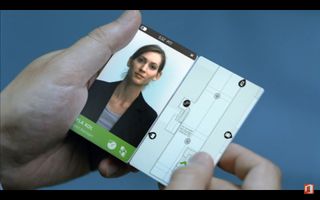
Thus, such a device would not be a phone any more than a Surface Pro from which one can make Skype calls is a phone. It's a PC. And it is from this PC position that I believe Microsoft will be approaching the mobile war.
Full Windows on ARM and the millions of Win32 apps it brings to cellular PCs and this potential ultramobile Surface are not merely about expanding the catalog of apps on a Windows phone. It is about Microsoft expanding the definition and footprint of the PC deeper into the mobile space.
Ultra-mobile PCs are a natural solution to declining PC market & natural evolution to plateauing smartphone market. https://t.co/n45KYJVqJoUltra-mobile PCs are a natural solution to declining PC market & natural evolution to plateauing smartphone market. https://t.co/n45KYJVqJo— Jason L Ward (@JLTechWord) April 19, 2016April 19, 2016
Microsoft is expanding the definition and footprint of the PC deeper into the mobile space.
Microsoft's ultramobile Surface is the solution to a declining PC market and evolution to a plateauing smartphone market. It is a long play where Microsoft will be placing a highly portable Windows 10 PC among its family of Surface PCs: the Surface, Surface Book and the reimagined desktop, the Surface Studio.
An adaptive shell will ensure a touch-friendly mobile experience on this ultramobile PC. Continuum will allow for a rich desktop experience where a user will be able to pin apps to a taskbar, use multiple Windows and more when connected to a larger display, mouse and keyboard.
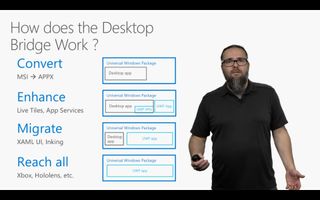
And, ideally Project Centennial, (which I've predicted Microsoft will aggressively push this year because of cellular PCs, Windows 10 Cloud and to prepare for an ultramobile Surface), will modernize Win32 apps by converting them to UWP apps. Furthermore, just as any Windows 10 PC runs both Win32 and Store apps, this ultramobile PC will as well and will benefit from Microsoft's efforts to bring UWP apps to the platform through the app bridges and other means. And, yes, it will make phone calls.
Would criticism of an ultramobile PC persist if Microsoft were successful in mobile?
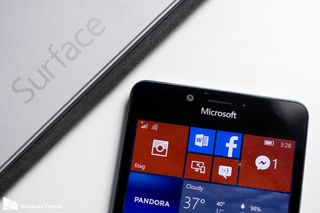
Samsung's next flagship might have a Continuum-like feature, allowing users to dock their phones and have desktop-like experiences. Though there are challenges to Android's desktop experience, such a move is likely seen as a beneficial evolution of Android's success in mobile. With a catalog of mobile apps in the millions and mobile success backing it, there is likely little resistance to Samsung making this move.
The PC, merged with the phone, is being pushed into a new form factor and deeper into the mobile space.
What if Microsoft had a strong UWP app catalog comparable to that of Apple's and Google's app stores, and it was equally successful in mobile? If that were the case, I doubt its choice to add 16 million legacy apps to that resource, via full Windows on an ultramobile PC positioned to redefine and expand the footprint of the PC further into mobile, would be met with, "No one wants Win32 apps on a phone." This is true particularly because adaptive shells assure users of a smooth mobile experience, and Continuum's continued evolution will provide an experience comparable to a desktop experience.
It would likely be perceived by many as the natural evolution and converging of personal computing within the Windows ecosystem. Its position in mobile would be retained and merged with a PC strategy that would be pushing the PC into a new form factor and deeper into the mobile space.
Pushing the PC into smartphone territory

In the absence of being preceded with a successful position in mobile, Microsoft is attempting to do just this. With full Windows 10 on an ultramobile Surface, Redmond will be adding its vast Win32 app library to just about 600,000 Store apps. Rival platforms have stores that exceed two million apps.
A PC, not a phone, is being positioned to affect Microsoft's mobile fortunes.
Microsoft's strategy is also a move being made in the wake of almost weekly announcements of apps leaving Windows and a shrinking smartphone market presence.
Though a critical eye is certainly warranted, this challenging position coupled with our expectations that a phone, not a PC, would be positioned to affect Microsoft's mobile fortunes may make some overly critical of this potential ultramobile PC strategy.
A PC perspective may hold promise for Microsoft partners
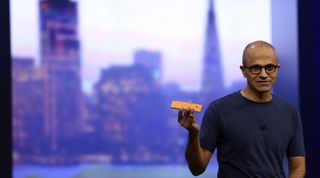
I don't believe this ultramobile Surface will immediately drive a mass of iPhone and Android phone users to Microsoft's mobile vision, as some fans may hope. Nor do I believe that it will be an absolute flop, as many critics claim. As a new type of PC with telephony capabilities, I believe that over time certain markets will slowly begin to embrace it. The enterprise will likely be first.
Microsoft's partners are more inclined to embrace the Surface PC vision than the phone vision.
Third-party manufacturers that are more inclined to embrace Microsoft's Surface PC vision than its phone vision, as evidenced by an industry explosion of 2-in-1s, may begin adding ultramobile PCs to their product portfolios.
Though there are challenges, such as necessary peripherals for Continuum, emerging regions (where a smartphone is usually a consumer's only computing device) may also be a market for an ultramobile PC.
Moreover, users in developed regions looking for a new PC may, in time, see an ultramobile PC that can be a full, highly portable PC and a phone as an option. Particularly, if Microsoft's app ecosystem efforts begin to meet with success (possibly driven in part by cellular PCs beginning later this year) and the Home Hub vision begins to take root.
Continuum's Proximity Connect on an ultramobile Surface in a Home Hub setting, which immediately connects a device, whether it's in a pocket, bag or hand, to a docking station at home (or work) is an appealing feature.
With the right perception comes the right questions
Will Microsoft's ultramobile PC strategy work? I don't know, but a plan at least provides hope. Whatever the outcome, our perception needs to shift from a smartphone-centric point of view to a PC-centric one. We need to look at Microsoft's strategy from its strategic position rather than from the position that our past experiences and the "smartphone war" have trained us to see.
Can Microsoft further redefine the PC and push it into the smartphone space?
Microsoft's mobile war has the company approaching mobile computing and telephony from an entirely new angle.
When we consider what Microsoft is actually doing we realize that the question isn't, "Who wants Win32 apps on a phone?" The better question is, "Can Microsoft further redefine the PC, push it deeper into the mobile space and successfully begin to overlap (even in part) the smartphone market?"
Following the story
What Android and iPhone need to know about Windows phone
Windows phone isn't dead
- If Microsoft doesn't kill at BUILD 2017, the Surface phone may be dead on arrival
- Is early 2018 too early for a Surface phone?
- Will Samsung beat Microsoft to market with an ultimate Mobile device?
- Did Microsoft give us a glimpse of its Surface phone vision
Smartphones are dead
The untold app gap story
Windows Mobile and the enterprise
I'm a Windows phone fan in an iPhone/Android world. Why? Microsoft has it going on!
The Surface Phone
Jason L Ward is a columnist at Windows Central. He provides unique big picture analysis of the complex world of Microsoft. Jason takes the small clues and gives you an insightful big picture perspective through storytelling that you won't find *anywhere* else. Seriously, this dude thinks outside the box. Follow him on Twitter at @JLTechWord. He's doing the "write" thing!

